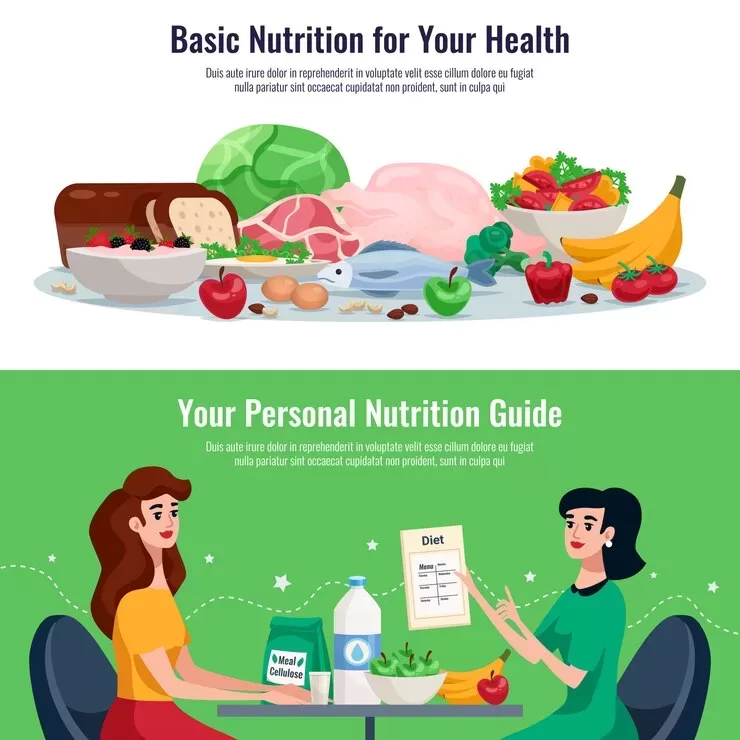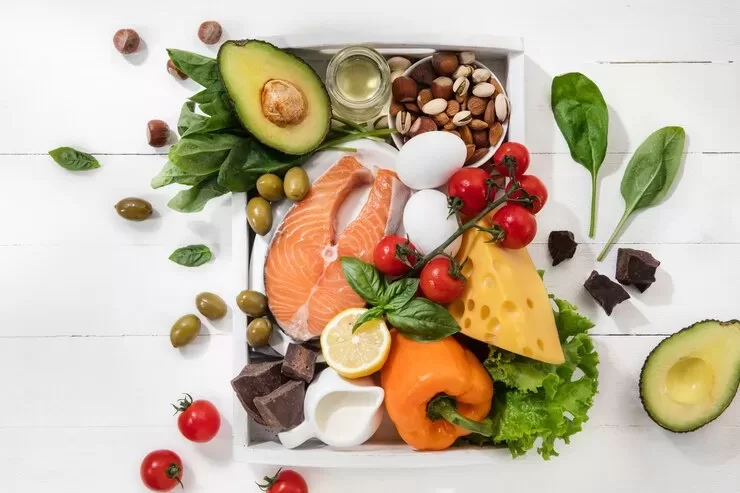Tired of the same old weight loss routines that never seem to work? Are you ready to shed those unwanted pounds in just few days? Imagine waking up feeling lighter, more energetic, and confident in your body. It’s possible! This article reveals simple yet powerful habits that can help you achieve your weight loss goals naturally and sustainably. Discover daily routines that will accelerate your progress, learn how to maintain your weight loss long-term, and even target stubborn belly fat.
Nutrition plays a pivotal role in achieving this goal. It’s not just about shedding pounds; it’s about nourishing our bodies with the right nutrients to fuel our minds, boost our energy levels, and improve our overall well-being.
Gone are the days of restrictive diets and unsustainable quick fixes. In today’s world, sustainable weight loss is all about adopting a balanced approach to nutrition and lifestyle. Whether you’re looking to shed a few pounds, improve your athletic performance, or simply feel better overall, understanding the principles of nutrition and weight loss is essential.

Understanding Weight Loss
Recent studies have shown that weight gain is often a complex interplay of genetic, environmental, and behavioral factors. While some individuals may have a genetic predisposition to weight gain, lifestyle choices play a significant role in determining overall body weight.
Factors Contributing to Weight Gain
Understanding the factors that contribute to weight gain is the first step in developing a successful weight loss plan. While genetics and hormonal imbalances can play a role, lifestyle factors often play the most significant role.
- Caloric imbalance: Consuming more calories than you burn.
- Genetics: Predisposition to weight gain or difficulty losing weight.
- Hormonal imbalances: Conditions like hypothyroidism or polycystic ovary syndrome (PCOS).
- Lifestyle factors: Sedentary lifestyle, lack of sleep, stress, and unhealthy eating habits.
- Medications: Certain medications can cause weight gain as a side effect.
Difference Between Healthy and Unhealthy Weight Loss
When it comes to weight loss, it’s important to focus on sustainable and healthy approaches. Healthy weight loss involves gradual changes to your diet and lifestyle, while unhealthy weight loss often involves extreme measures that can be harmful to your health.
| Feature | Healthy Weight Loss | Unhealthy Weight Loss |
| Approach | Gradual, sustainable | Rapid, often drastic |
| Methods | Balanced diet, regular exercise, lifestyle changes | Restrictive diets, unhealthy eating habits, supplements |
| Focus | Overall health and well-being | Quick results, appearance |
| Results | Sustainable weight loss, increased energy, improved mood | Temporary weight loss, potential health risks |
| Side Effects | Minimal or none | Fatigue, dizziness, nutrient deficiencies, muscle loss |
| Sustainability | Easier to maintain | Difficult to maintain, often leads to weight gain |
| Examples | Incorporating more fruits and vegetables, increasing physical activity, reducing processed foods | Fad diets like keto or intermittent fasting, excessive calorie restriction, using diet pills |
Importance of Sustainable Weight Loss
Sustainable weight loss is not just about shedding pounds; it’s about improving your overall health and well-being. By focusing on sustainable approaches, you’re more likely to achieve long-term success and maintain a healthy weight.
| Benefit | Description |
| Long-term success | More likely to maintain weight loss over time due to sustainable lifestyle changes. |
| Improved health | Reduced risk of chronic diseases like heart disease, diabetes, and stroke. |
| Increased energy levels | A balanced diet provides the nutrients needed for optimal energy, reducing fatigue and improving overall vitality. |
| Improved self-esteem | Achieving a healthy weight can boost confidence and self-esteem, leading to a more positive outlook on life. |
| Better sleep | A healthy weight can improve sleep quality, leading to better overall well-being. |
| Reduced risk of certain cancers | Maintaining a healthy weight can lower the risk of certain types of cancer, such as colon and breast cancer. |
| Improved joint health | A healthy weight can reduce stress on joints and help prevent conditions like osteoarthritis. |
| Enhanced mental clarity | Proper nutrition supports brain function, leading to improved focus, concentration, and memory. |
Essential Nutrients for Weight Loss
Recent studies have highlighted the importance of a balanced intake of macronutrients and micronutrients for effective weight management. While calorie control remains a crucial factor, the quality of the nutrients consumed is equally important.
Role of Macronutrients
Macronutrients, including carbohydrates, proteins, and fats, provide the building blocks and energy for our bodies. While all three are essential, their balance plays a crucial role in weight management.
| Macronutrient | Function | Good Sources |
| Carbohydrates | Provide energy for the body. Complex carbohydrates, found in whole grains, fruits, and vegetables, are generally preferred for their nutritional value and slower digestion. | Whole grains (brown rice, quinoa, whole wheat bread), fruits (berries, apples, bananas), vegetables (sweet potatoes, carrots, legumes) |
| Proteins | Build and repair tissues. Adequate protein intake is essential for weight loss and muscle maintenance. | Lean meats (chicken, turkey, fish), legumes (beans, lentils), eggs, dairy products (yogurt, cheese) |
| Fats | Provide essential fatty acids and support hormone production. Healthy fats, found in avocados, nuts, seeds, and olive oil, are beneficial for weight management. | Avocados, nuts (almonds, walnuts), seeds (chia seeds, flaxseeds), olive oil, fatty fish (salmon, mackerel) |
Importance of Micronutrients
Micronutrients, such as vitamins and minerals, are essential for various bodily functions, including metabolism, energy production, and immune function.
Vitamins
They are vital for metabolism, the process by which the body converts food into energy. Without sufficient vitamins, metabolic processes can slow down, leading to weight gain and other health issues. Additionally, vitamins are involved in energy production, ensuring that the body has the fuel it needs to function optimally. They also play a critical role in maintaining a strong immune system, helping the body fight off infections and diseases.
Water-soluble vitamins, such as vitamin C and B vitamins, dissolve in water and are not stored in the body. They need to be replenished daily through dietary sources. Fat-soluble vitamins, including vitamins A, D, E, and K, are stored in the body’s fat tissues and can be absorbed with the help of dietary fats. While the body can store these vitamins for longer periods, excessive intake can lead to toxicity.
Minerals
They play vital roles in a wide range of bodily functions, from maintaining strong bones and teeth to regulating blood pressure and supporting energy metabolism.
One of the most well-known minerals is calcium, which is essential for building and maintaining strong bones and teeth. Calcium is also involved in muscle contraction, nerve function, and blood clotting. Iron is another important mineral that is necessary for the production of red blood cells, which carry oxygen throughout the body. Iron deficiency can lead to anemia, a condition characterized by fatigue, weakness, and shortness of breath.
Other essential minerals include magnesium, which is involved in over 300 biochemical reactions in the body, including energy production, muscle function, and nerve transmission. Potassium is crucial for maintaining fluid balance in the body, regulating blood pressure, and supporting heart health. Zinc is a vital mineral for immune function, wound healing, and taste perception.
Benefits of Fiber-Rich Foods
Fiber is a type of carbohydrate that is not digested by the body. It can help promote feelings of fullness, regulate digestion, and support weight management.
| Benefit | Description |
| Promotes satiety | Fiber-rich foods can help you feel full for longer, reducing overall calorie intake and aiding in weight management. |
| Supports digestion | Fiber helps regulate bowel movements, preventing constipation and promoting healthy digestion. |
| Lowers cholesterol | Soluble fiber can help lower cholesterol levels by binding to cholesterol in the digestive tract, preventing its absorption. |
| Supports weight management | Incorporating fiber-rich foods into your diet can help with weight loss and maintenance by promoting satiety and reducing calorie intake. |
| Improves blood sugar control | Fiber can help slow down the absorption of glucose, leading to more stable blood sugar levels and reducing the risk of diabetes. |
| Prebiotic effects | Fiber can act as a prebiotic, feeding beneficial gut bacteria and promoting a healthy microbiome, which is linked to various health benefits. |
| Reduces the risk of certain diseases | A diet high in fiber has been associated with a reduced risk of heart disease, stroke, type 2 diabetes, and certain types of cancer. |
Creating a Balanced Diet for Weight Loss
Creating a balanced diet is essential for sustainable weight loss. By focusing on whole foods, limiting processed foods, and practicing portion control, you can provide your body with the nutrients it needs while supporting your weight loss goals.
Portion Control: The Key to Sustainable Weight Loss
Portion control, the practice of eating appropriate amounts of food, is a cornerstone of sustainable weight loss. Research conducted by the Harvard T.H. Chan School of Public Health found that individuals who consistently practice portion control are more likely to achieve and maintain a healthy weight.
By being mindful of the amount of food you consume, you can reduce your overall calorie intake without feeling deprived. It’s important to listen to your body’s hunger and fullness cues, and avoid overeating. A helpful tool is to use smaller plates and bowls to visually reduce portion sizes.
Importance of Regular Meals and Snacks
Eating regular meals and snacks throughout the day can help regulate your metabolism, prevent overeating, and maintain energy levels.
- Regulates metabolism: Eating regularly helps your body burn calories at a steady pace.
- Prevents overeating: Skipping meals can lead to excessive hunger and overeating later in the day.
- Maintains energy levels: Regular meals and snacks provide a consistent source of energy.
Tips for Choosing Healthy Foods and Beverages
Making healthy choices when it comes to food and beverages is essential for weight loss.
- Focus on whole foods: Choose whole grains, fruits, vegetables, lean proteins, and healthy fats.
- Limit processed foods: Processed foods are often high in unhealthy fats, added sugars, and sodium.
- Choose healthy fats: Incorporate healthy fats like avocados, nuts, seeds, and olive oil into your diet.
- Stay hydrated: Drink plenty of water throughout the day.
- Limit sugary drinks: Opt for water, unsweetened tea, or infused water instead of sugary drinks.
Suggestions for Meal Planning and Preparation
Meal planning and preparation can help you stay on track with your weight loss goals.
- Plan your meals in advance: This will help you make healthier food choices and avoid impulsive decisions.
- Prepare meals and snacks in advance: Cooking meals and snacks in advance can save time and money.
- Pack healthy snacks: Keep healthy snacks on hand to avoid unhealthy temptations.
- Experiment with new recipes: Trying new recipes can help you stay motivated and excited about your diet.
Lifestyle Factors for Weight Loss
Beyond nutrition, lifestyle factors play a significant role in weight management. Incorporating regular physical activity, prioritizing sleep, and managing stress are essential components of a healthy weight loss journey.
The Role of Physical Activity in Weight Loss
Regular physical activity is crucial for weight loss and overall health. Engaging in various forms of exercise helps burn calories, build muscle mass, and improve cardiovascular health. Studies conducted by the Mayo Clinic have shown that individuals who combine a healthy diet with regular exercise are more likely to achieve and maintain long-term weight loss. Aim for at least 150 minutes of moderate-intensity exercise per week.
Importance of Sleep for Weight Management
Adequate sleep is often overlooked but plays a vital role in weight management. Lack of sleep can disrupt hormones that regulate appetite and metabolism, leading to weight gain.
- Hormone regulation: Sleep deprivation can disrupt hormones like leptin and ghrelin, which control hunger and satiety.
- Metabolism: Lack of sleep can slow down your metabolism, making it harder to burn calories.
- Increased cravings: Sleep deprivation can lead to increased cravings for unhealthy foods.
Impact of Stress on Weight Gain and Loss
Chronic stress can have a significant impact on weight management. When you’re stressed, your body may produce cortisol, a hormone that can increase appetite and promote fat storage.
- Increased appetite: Stress can trigger cravings for unhealthy foods, leading to increased calorie intake.
- Fat storage: Chronic stress can promote the storage of fat, particularly in the abdominal area.
- Reduced physical activity: Stress can make it difficult to find the motivation to exercise.
Tips for Managing Stress and Improving Sleep Quality
Managing stress and improving sleep quality are essential for weight loss and overall well-being.
- Practice stress management techniques: Incorporate relaxation techniques like meditation, yoga, or deep breathing into your daily routine.
- Create a sleep-conducive environment: Ensure your bedroom is dark, quiet, and cool.
- Establish a consistent sleep schedule: Go to bed and wake up at the same time each day.
- Limit screen time before bed: The blue light emitted from electronic devices can interfere with sleep.
- Avoid caffeine and alcohol before bed: These substances can disrupt sleep.
Common Weight Loss Mistakes
It’s important to be aware of common weight loss mistakes to avoid setbacks and ensure a sustainable approach. One of the biggest pitfalls is falling for fad diets and quick fixes.
The Dangers of Fad Diets and Quick Fixes
Fad diets often promise rapid weight loss but are often unsustainable and can be harmful to your health. Studies conducted by the American Heart Association have shown that individuals who follow restrictive diets are more likely to regain weight in the long run. Quick fixes, such as detox programs or weight loss pills, can also be dangerous and may have serious side effects.
Importance of Consulting a Healthcare Professional
Before starting any weight loss program, it’s essential to consult with a healthcare professional. They can assess your individual needs, provide personalized guidance, and address any underlying health conditions.
- Personalized guidance: A healthcare professional can help you develop a weight loss plan that is tailored to your specific needs and goals.
- Address underlying health conditions: Certain health conditions may affect weight management. A healthcare professional can help identify and address any underlying issues.
- Monitor progress: Regular check-ins with a healthcare professional can help you track your progress and make adjustments as needed.
Risks of Unhealthy Weight Loss Practices
Unhealthy weight loss practices can have serious consequences for your health.
- Nutrient deficiencies: Restrictive diets can lead to nutrient deficiencies, which can have a negative impact on your overall health.
- Muscle loss: Rapid weight loss can result in muscle loss, which can weaken your body and increase the risk of injuries.
- Metabolic slowdown: Extreme dieting can slow down your metabolism, making it harder to maintain weight loss.
- Eating disorders: Unhealthy weight loss practices can contribute to the development of eating disorders, such as anorexia or bulimia.
Remember, weight loss is a journey, not a destination. By incorporating the principles discussed in this article and adopting a sustainable approach, you can achieve your weight loss goals and improve your overall health.
For even more inspiration and delicious recipes that support your weight loss journey, explore our site! Discover healthy and flavorful dishes from various cultures that nourish your body and satisfy your taste buds in our Best Selling Paleo CookBook. Take control of your health today, and embark on a delicious path to a healthier you!
FAQs
How can I lose weight in 7 days naturally?
While rapid weight loss is possible, it’s often unsustainable. For healthy, long-term results, focus on consistent lifestyle changes rather than quick fixes. Prioritize balanced nutrition, regular exercise, and adequate sleep.
What are 5 tips for weight loss?
- Control portions.
- Choose whole, unprocessed foods.
- Stay hydrated.
- Get regular exercise.
- Manage stress.
What habits burn fat?
Regular exercise is key for fat burning. High-intensity interval training (HIIT) and strength training can be particularly effective. Additionally, prioritizing sleep and managing stress can support weight loss efforts.
What are 7 healthy ways to lose weight?
- Eat a balanced diet.
- Stay active.
- Get enough sleep.
- Manage stress.
- Limit processed foods.
- Stay hydrated.
- Seek professional guidance if needed.







